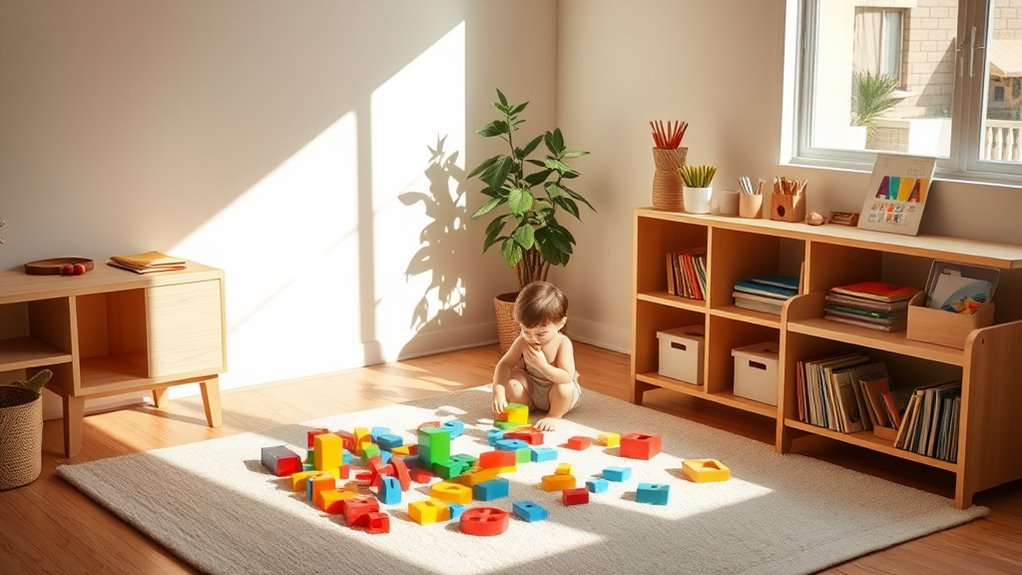Understanding the Principles of Montessori Parenting
When you consider Montessori parenting, you’re looking at a philosophy that shifts the focus from traditional teaching methods to a more child-centered approach. This method emphasizes the importance of fostering independence and allowing your child to explore their natural curiosity. By creating an environment that invites discovery, you can support their development in profound ways. However, understanding how to apply these principles effectively can be complex, especially when it comes to observing your child’s unique needs and interests. What might that look like in practice?
Core Philosophy of Montessori Parenting
While many parenting styles emphasize control and discipline, Montessori parenting focuses on fostering independence and curiosity in children. At the heart of this approach is the belief that children learn best when they’re free to explore their interests. Instead of following a strict curriculum, you’ll notice that Montessori emphasizes a child-centered environment where learning becomes a natural, enjoyable process.
In a Montessori setting, you observe that children are encouraged to take charge of their own learning. You’ll find classrooms designed with various materials that invite exploration, allowing kids to engage with concepts at their own pace. This method values hands-on experiences, promoting active participation rather than passive listening.
Moreover, Montessori parenting respects each child’s unique development and individual pace. You won’t hear a lot of “shoulds” or “musts” because it’s all about supporting your child’s natural instincts. By providing choices, you empower them to make decisions, which builds confidence and fosters a love for learning.
This philosophy not only nurtures a child’s curiosity but also lays the groundwork for lifelong skills, like problem-solving and critical thinking, making Montessori parenting a truly enriching experience for both you and your child.
Fostering Independence in Children
Fostering independence in children is a key principle of Montessori parenting that encourages self-sufficiency and confidence. When you allow your child to take on age-appropriate tasks, you help them develop critical life skills. Start small—let them choose their clothes or help with meal prep. These little choices empower them and build their decision-making abilities.
Encouraging independence also means stepping back at times. Resist the urge to jump in and solve problems for them. Instead, give them the space to explore solutions on their own. It’s okay if they make mistakes; that’s part of the learning process. By tackling challenges, they’ll gain resilience and resourcefulness.
Create an environment that promotes independence. Set up accessible spaces where they can reach toys, books, or art supplies. This not only fosters exploration but also invites creativity.
Celebrate their successes, no matter how small, and provide gentle guidance when needed. As they learn to accomplish tasks independently, their self-esteem will grow, laying a strong foundation for future challenges.
Respecting Natural Development
Respecting natural development is essential in Montessori parenting, as it honors each child’s unique growth trajectory. When you allow your child to progress at their own pace, you’re fostering their confidence and independence. Every child has their own timeline for mastering skills, from walking to reading, and recognizing this is vital.
Encouragement plays a significant role here. Rather than pushing your child to meet specific milestones, celebrate their individual achievements, no matter how small. This approach helps them feel valued and understood, which boosts their motivation to learn.
You can observe your child’s interests and strengths, tailoring activities that resonate with them rather than conforming to a rigid curriculum. For example, if they show curiosity about nature, take the opportunity to explore it together.
Moreover, patience is key. It’s natural to feel anxious about your child’s progress, but staying calm and supportive helps create a secure environment. When you trust in their development, you’re teaching them to trust themselves.
Ultimately, respecting natural development nurtures a love for learning that lasts a lifetime, setting the foundation for their future growth and success.
Creating a Nurturing Environment
Creating a nurturing environment is essential for supporting your child’s natural development. You’ll want to focus on creating spaces that are safe, inviting, and conducive to learning.
Start by organizing your home, making certain your child can easily access toys, books, and other materials. This helps them feel independent and confident as they explore their interests.
Consider using natural materials, like wood and cotton, which aren’t only sustainable but also promote a calming atmosphere. Soft colors and minimal clutter can enhance focus and creativity, allowing your child to thrive.
It’s also important to guarantee your child has a designated area for quiet time, where they can retreat and recharge.
Encouraging your child to take part in daily chores fosters a sense of responsibility. Simple tasks, like setting the table or watering plants, help them feel valued and connected to the home.
Additionally, spend time engaging with your child in their interests, whether it’s reading together or working on a craft. This not only strengthens your bond but also shows your child that you value their passions, laying the foundation for a lifelong love of learning.
Encouraging Exploration and Discovery
Encourage your child’s natural curiosity by providing opportunities for exploration and discovery in their everyday life. Children learn best when they can engage with their environment, so let them touch, feel, and experiment with different materials.
Create a space where they can safely explore various textures, sounds, and colors. Simple household items can become tools for discovery. A cardboard box can transform into a spaceship, while kitchen utensils can inspire a band!
Take time to go outdoors, too. Nature offers endless possibilities for exploration. Go on nature walks, collect leaves, or observe insects.
Ask open-ended questions to spark their imagination and encourage them to think critically about what they see. “What do you think that bird is doing?” or “How does this leaf feel?” These questions can guide them to explore deeper and form connections.
The Role of Observation in Parenting
Observation plays an essential role in understanding your child’s needs and interests. By closely watching how your child interacts with their environment, you can gain valuable insights into their preferences and strengths. This practice allows you to tailor your parenting approach, ensuring you’re providing the right support at the right time.
When you take the time to observe, you might notice your child gravitating towards certain activities or materials. Maybe they love building with blocks or are fascinated by nature. Recognizing these interests can help you create an enriching environment where they can thrive. Instead of directing their play, you can facilitate their exploration, giving them the freedom to learn at their own pace.
Additionally, observing your child’s social interactions can reveal how they communicate and connect with others. This awareness will help you guide them in developing strong relationships and understanding their emotions.





